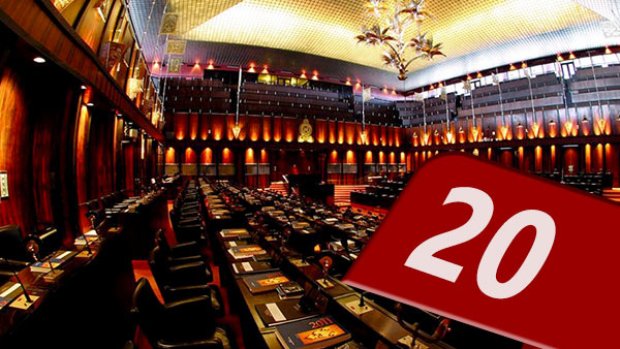COLOMBO– The government is determined to follow procedure and not make any changes to the 20th Amendment to the Constitution before it reaches the Committee stage in Parliament, a highly placed source in the prime minister’s office said.
“The legal process is that the proposal is gazetted and once approved by Cabinet it can be tabled before Parliament,” the senior official said, adding there was no need for any changes to be made, and they legally they cannot be made before the Committee stage.
Asked whether the report produced by the ministerial committee appointed by Prime Minister Mahinda Rajapaksa would be incorporated into the 20A he said, “There is no report from that committee.”
Meanwhile, the Supreme Court as of Wednesday (23) evening had received six Fundamental Rights petitions challenging the proposed amendment.
They are from an independent lawyer, the Centre for Policy Alternatives with Dr. Paikiasothy Saravanamuttu as petitioner, the Samagi Jana Balavegaya with party General Secretary Ranjith Madduma Bandara as petitioner, the Ilankai Tamil Arasu Katchi with R. Sampanthan as petitioner, and two others.
The United National Party and the True Patriot Organization led by former minister Mangala Samaraweera are due to file petitions on Thursday (24).
Among those who have objected to the 20A is the Retired Judges Association (RJA) which has written to the Minister of Justice Ali Sabry saying it is “gravely perturbed” by the potential impact of the draft 20th Amendment on the constitutional separation of powers, particularly in relation to the selection and appointment of judges to the Court of Appeal and the Supreme Court.
The letter published in an English weekend paper, notes that as emphasized in the Commonwealth (Latimer House) principles on the three branches of government, an accountable and publicly transparent process of appointment of judges is integral to upholding the Rule of Law, engendering public confidence and dispensing justice.
The letter adds, “As such, we are concerned by the amendment of Article 41A of the Constitution to replace the Constitutional Council having the power of issuing recommendations by a Parliamentary Council, which can only make observations in regard to pending judicial appointments. We note that the Parliamentary Council lacks an important element of non-political membership. We also note that the inclusion of civil society members in the Constitutional Council was a feature of the Seventeenth Amendment to the Constitution, as continued by the 19th Amendment, both amendments being passed to public and parliamentary acclaim.”
-economynext.com


